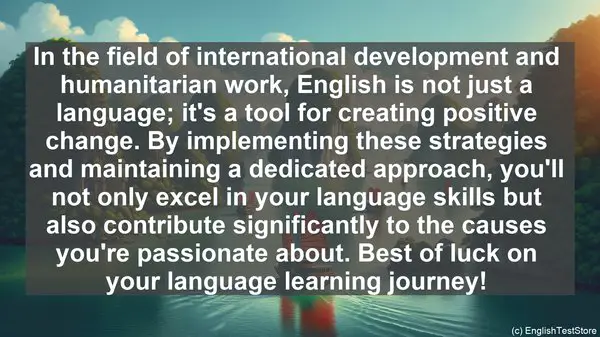Introduction: The Importance of English in International Development and Humanitarian Work
As you embark on a journey in the field of international development and humanitarian work, one skill that will greatly enhance your effectiveness is English proficiency. In this video, I’ll be sharing 10 strategies that will help you master English, enabling you to communicate, collaborate, and make a significant impact in your work.

1. Immerse Yourself in English Content
To truly grasp a language, immerse yourself in it. Read English books, watch movies, listen to podcasts, and engage with English-speaking communities online. This constant exposure will improve your vocabulary, grammar, and overall comprehension.
2. Practice Speaking Regularly
Speaking is a skill that requires practice. Find opportunities to converse in English, whether it’s through language exchange programs, joining discussion groups, or even recording yourself and analyzing your own speech. The more you speak, the more confident and fluent you’ll become.

3. Focus on Professional Vocabulary
English in the international development and humanitarian field has its own set of specialized vocabulary. Dedicate time to learning and understanding these terms, as they will be crucial in your work and interactions with colleagues and stakeholders.
4. Enhance Your Writing Skills
Clear and concise writing is essential in this field. Practice writing reports, proposals, and emails, paying attention to structure, coherence, and grammar. Seek feedback from peers or mentors to continuously improve.
5. Develop Listening Skills
In meetings, workshops, or even casual conversations, effective listening is key. Train yourself to understand different accents, take notes, and ask clarifying questions. This active listening will not only improve your comprehension but also demonstrate your engagement.
6. Utilize Online Resources
The internet is a treasure trove of language learning resources. From grammar tutorials to interactive exercises, there are numerous websites and apps that can supplement your learning journey. Take advantage of these accessible tools.
7. Engage in Group Activities
Language learning is often more effective in a group setting. Join study groups, participate in language clubs, or even organize language-related events. Collaborative activities foster a supportive and interactive learning environment.
8. Stay Updated with Current Affairs
English is a dynamic language, and staying updated with current affairs not only improves your general knowledge but also exposes you to contemporary vocabulary and expressions. Read news articles, follow relevant blogs, and engage in discussions on global issues.
9. Seek Cultural Understanding
Language and culture are intertwined. To truly master English, strive to understand the cultural nuances and context. This will not only avoid misunderstandings but also enhance your ability to connect with people from diverse backgrounds.
10. Never Stop Learning
Lastly, language learning is a continuous process. Even when you feel proficient, there’s always room for improvement. Embrace opportunities for further learning, whether it’s through advanced courses, workshops, or even informal language exchanges.
